Home Fire Alarm Keeps Going Off? Troubleshoot and Fix It Now
Ever jumped out of your skin because your home fire alarm keeps going off unexpectedly? Not only can this be jarring but it also dilutes the significance of the real warning signs of danger. It’s a common problem, often linked to issues like dying batteries or incorrect positioning. But what if I told you there’s more to it?
In this article, you’ll get to dig into the true reasons behind your faulty alarm system, armed with fruitful insights that I’ve drawn from my years of expertise in home security. Essentially, it’s about understanding the core of the problem – and nailing the preventive measures.
With the right knowledge at your fingertips, you could defuse this ticking time bomb quickly and effectively. Welcome to a world where you can enjoy a safer, and less noisy, home environment.
Common Reasons Why Home Fire Alarms Keep Going Off
Dying or Dead Batteries
One of the most frequent causes for a home fire alarm keeps going off is due to dying or dead batteries. These devices are designed to sound an alarm when their electrical current drops, which is a common indicator of low battery power. To prevent this, batteries should be replaced at least every six months. Regular maintenance can ensure that the smoke detector functions correctly, avoiding unnecessary disturbances.
Improper Placement of Smoke Detectors
Placement of smoke detectors is crucial for their effective operation. Mistakes here can easily trigger unnecessary alarms, leading to frustration and potential safety risks.
Too Close to Bathrooms
Detectors installed too close to bathrooms can be triggered by steam from hot showers. Ever notice your alarm going off after a steaming shower? This steam mimics smoke and can cause the alarm to go off frequently, even in the absence of an actual fire. Moving the detector a bit further from the bathroom can solve this.
Near Kitchens
Placing smoke detectors near kitchens can lead to false alarms during cooking. Smoke and even minor cooking fumes can set off the alarms. The solution? Keep detectors a safe distance away, reducing these annoying interruptions.
Environmental Factors
Believe it or not, everyday activities and household products can set off your fire alarm.
Steam from Showers
Steam from showers is a well-known factor that can set off smoke detectors. This is especially true for detectors located near bathrooms. The steam disrupts the sensor’s ability to distinguish between smoke and non-hazardous vapors, resulting in false alarms.
Volatile Organic Compounds
Volatile organic compounds (VOCs) present in paints, cleaning agents, and other household chemicals can also trigger smoke detectors. These compounds can interfere with the detector’s sensors and cause the alarm to sound unexpectedly. It’s important to ventilate areas where such compounds are in use and to keep detectors away from these chemicals as much as possible.
Outdated Smoke Detectors
Outdated smoke detectors are another common reason why a home fire alarm keeps going off. Newer models are more finely tuned and sensitive compared to their older counterparts. Aged detectors may not work as intended, leading to increased chances of false alarms. Regularly updating and replacing old detectors can prevent these issues and ensure better safety for your home.
Understanding Smoke Detector Alarms and Sounds
Smoke detectors are vital for home safety, offering different types of alarms to alert you to various issues. Understanding these sounds can help you respond appropriately and ensure your home remains safe.
Continuous Alarms Indicating Real Threats
When your home fire alarm keeps going off with a continuous sound, it usually signals a real threat. This could mean the presence of fire or significant smoke. In such cases, it’s crucial to act immediately. Inspect your property carefully for any signs of a fire or substantial smoke. If you find any, evacuate the premises immediately and call emergency services. Continuous alarms should never be ignored, as they are designed to alert you to potential danger, providing you with the critical time needed to ensure your safety.
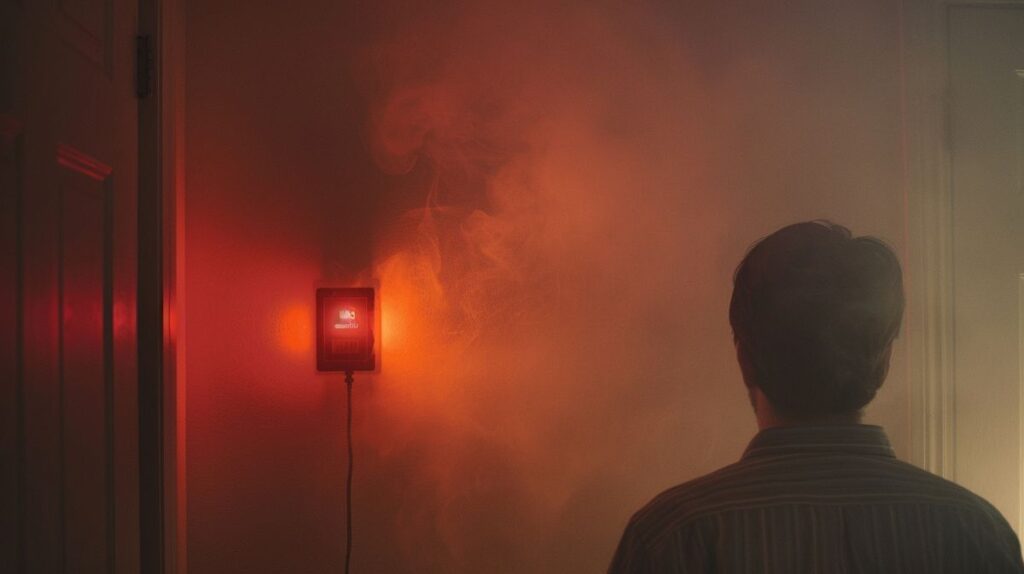
Intermittent Chirps for Unit Errors or Low Batteries
Ever noticed those annoying beeps in the middle of the night? If your home fire alarm keeps going off with intermittent chirps, it generally indicates an issue that needs attention but not an immediate threat. These chirps often signal low batteries or unit errors.
Think of it like your car’s low fuel warning. The engine’s fine, but it needs attention. Intermittent chirping can be a nuanced way smoke detectors communicate that they need maintenance. To address this, inspect the unit and replace the batteries as needed, typically at least every six months. Regular maintenance and timely battery replacements help ensure your smoke detector functions correctly and minimize unnecessary disruptions.
Steps to Prevent Your Home Fire Alarm from Going Off Unnecessarily
Regular Maintenance and Cleaning
Ever had your home fire alarm keep going off without a reason? Regular maintenance might be the solution you need. Let’s dive into some practical steps.
Vacuuming Dust Accumulation
- Dust accumulation can mess with a smoke detector, leading to false alarms. Keep them clean!
- A simple fix? Regularly vacuum around detectors using the brush attachment. Make sure no dust or debris blocks the sensors.
- Tip: Aim to clean detectors at least once a month for the best performance.
Battery Replacement
When a home fire alarm keeps going off, it’s often because of dying batteries. Stay ahead of it with regular replacements.
How Often to Replace Batteries
- Swap those batteries at least every six months. Trust me, it’s a simple step to avoid annoying false alarms.
- Set reminders on your phone or mark your calendar. Consistent battery changes ensure your smoke alarm works precisely when needed.
- Notice those intermittent chirps? They’re a cry for fresh batteries. Don’t ignore them; replace immediately!
Proper Placement of Smoke Detectors
Where you install your smoke detectors matters. Proper placement can prevent any unnecessary alarm activations.
Avoid High Humidity Areas
- High humidity spots, like bathrooms, can trigger false alarms. Steam can fool the sensors.
- Install detectors at least 10 feet away from humid areas. This reduces the chances of unwanted activations.
- Pro Tip: Use exhaust fans in bathrooms to keep moisture levels down.
Keep Away from Kitchens and Bathrooms
- Placing alarms near kitchens? They might go off from cooking smoke, leading to unnecessary heart-stopping moments.
- Install these detectors away from kitchen or bathroom emissions. Hallways or living areas are ideal spots.
- Consider specialized alarms near kitchens. They can differentiate between cooking smoke and an actual fire.

Dealing with Environmental Factors
Sometimes it’s not just about placement or maintenance—environmental factors play a huge role too. Here’s how you can handle them.
- Volatile organic compounds (VOCs) from paints or cleaning chemicals can trigger false alarms. Use these substances in well-ventilated areas.
- Extreme temperature changes can affect the sensitivity of smoke detectors. Keep a stable indoor environment for reliable alarm performance.
- Identify and address sources of frequent environmental changes, like dust or temperature fluctuations, to ensure your alarm remains trustworthy.
Types of Smoke Detectors and Their Sensitivity
Thinking about why your home fire alarm keeps going off? Choosing the right smoke detector can make a world of difference.
Traditional vs. Photoelectric Smoke Detectors
When it comes to preventing your home fire alarm from constantly going off, choosing the right type of smoke detector is crucial. Traditional ionization smoke detectors are known for their quick response to flaming fires. However, these are more prone to false alarms from cooking smoke. Picture this: you’re whipping up a meal only to be interrupted by your alarm. That’s where photoelectric smoke detectors come in—they use the photoelectric effect and excel at detecting smoldering fires, which produce more smoke. These detectors serve as a reliable alternative by reducing the frequency of unwarranted alarms.
False Alarms Due to Organic Compounds
Even the efficient photoelectric smoke detectors aren’t immune to triggering false positives. This often occurs when volatile organic compounds (VOCs)—like those found in certain paints or household chemicals—absorb the infrared light used by the detector’s sensors. To curb these incidents, consider where you place them. Avoid installing detectors in rooms just painted or areas where strong cleaning agents are frequently used. A strategic placement and timely maintenance can make your home fire alarm keep going off much less often.
Sensitivity to Humidifiers and Temperature Changes
Another culprit causing your home fire alarm to keep going off unnecessarily could be nearby humidifiers or areas with rapid temperature changes. Photoelectric detectors, in particular, can be sensitive to mist and steam—often produced by humidifiers or after a hot shower. Similarly, sudden temperature shifts can set off false alarms. To mitigate this, keep smoke detectors away from bathrooms, kitchens, and other places with fluctuating humidity or temperature levels. Ensuring these appliances are not close to your detectors can reduce false alarms, making your fire safety measures more reliable.
Steps to Take When Your Home Fire Alarm Keeps Going Off
Inspecting Your Property Thoroughly
When your home fire alarm keeps going off without any visible signs of fire, it’s critical to perform a thorough inspection of your property. Start by checking all rooms, especially those out of direct sight such as storerooms, basements, and attics, for any signs of smoke or burning smells. Pay extra attention to kitchens, where small, unnoticed fires can often start. If you find any signs of a potential fire, evacuate immediately and call emergency services.
Understanding When to Reset or Replace the Alarm
If your home fire alarm keeps going off despite there being no apparent danger, it might be time to reset or even replace the unit. Regularly test your smoke detectors by pressing the test button to ensure they are in working order. If the alarm continues to sound incorrectly, consult the user manual for instructions on resetting the unit. If the problem persists, it’s likely time to replace the smoke detector, especially if it’s more than ten years old or shows signs of malfunction.
Turning Off the Alarm Safely
Using the Hush Button
If your home fire alarm keeps going off due to non-emergency reasons, like cooking smoke or steam, temporarily silence it by pressing and holding the hush button. This button usually silences the alarm for a few minutes, giving time for smoke or steam to clear without turning off the detector entirely.
Flipping the Breaker Switch for Hard-Wired Alarms
For hard-wired fire alarms that are persistently activating, you can flip the breaker switch that controls the alarm system. This process will reset the unit and may resolve the false alarm issue. Ensure to flip the switch back to re-enable the alarm after the reset.
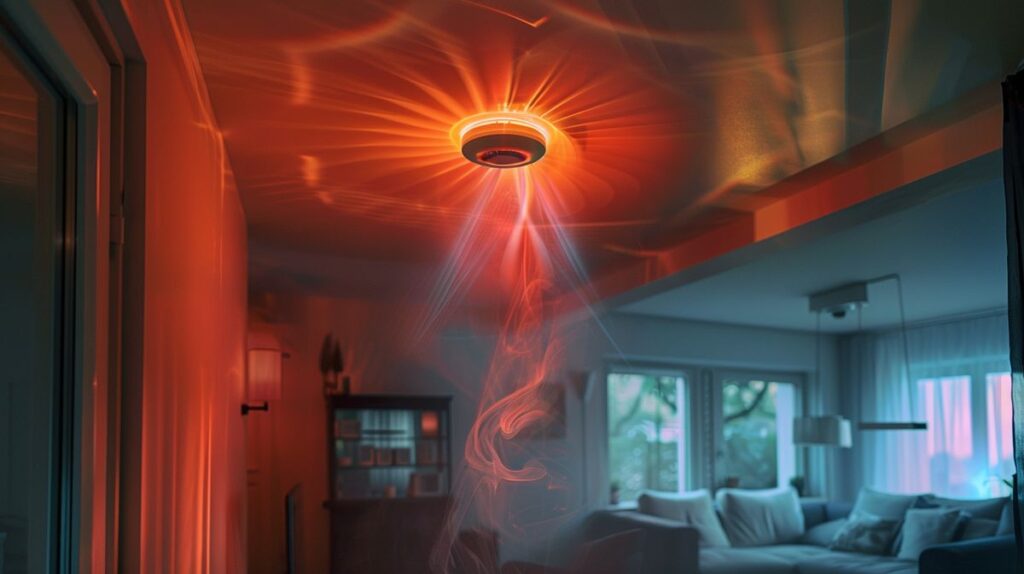
Replacing the Battery for Battery-Powered Alarms
If your battery-powered home fire alarm keeps going off, replacing the battery can often solve the issue. Ensure you use the correct battery type and replace it every six months to maintain the alarm’s functionality. After replacing the battery, test the alarm to confirm it’s working correctly and has stopped making unnecessary noise.
When to Seek Professional Help
Recognizing Persistent Issues
– If your home fire alarm keeps going off despite following troubleshooting steps, there may be deeper systemic issues at play.
Persistent false alarms? They could signal faulty wiring or a malfunctioning device, both problems that require professional intervention. If continuous or intermittent chirps persist even after battery changes and cleaning, or if consistent false alarms aren’t caused by environmental factors, it’s a clear sign you need expert assistance. Faulty alarms shouldn’t be part of your daily life—let the pros make sure your system is safe and sound. For a comprehensive comparison between top systems, check out our detailed guide on Xfinity Home Security vs ADT.
Contacting the Manufacturer for Support
– Dealing with a fire alarm that seems to have a mind of its own can be frustrating. Luckily, manufacturers often provide detailed support for common issues.
So, if your home fire alarm keeps going off and you’ve tried everything you know, the next logical step is to reach out to the manufacturer’s customer support. They offer product-specific advice and might have solutions you haven’t considered. Keep your model number handy; it speeds up the process and ensures you get the most accurate assistance possible. Don’t be afraid to lean on their expertise.
Understanding Warranty Periods and Services
– Those flashing lights and annoying beeps? They could mean your smoke detector needs more than a DIY fix.
Before you decide on anything, check the warranty period of your smoke detector. Many manufacturers offer repair or even replacement services within the warranty period, often at no extra cost. Knowing what’s available under your warranty can save you unnecessary expenses. Plus, it ensures your home fire alarm keeps going off only when it truly needs to, keeping you and your family safe.
Conclusion
Maintaining functional fire alarms is crucial for home safety, despite the occasional inconvenience of false alarms. Ensuring that your smoke detectors are in good working order can save lives and property. Here are some important points to remember:
1. Prioritize Regular Maintenance: One of the primary reasons a home fire alarm keeps going off is due to a lack of regular maintenance. Regular cleaning and vacuuming of your smoke detector can prevent false alarms caused by dust and debris. Forgetting to change batteries on time is another common culprit, so make it a habit to replace batteries at least every six months.
2. Proper Placement is Key: The placement of your smoke detectors can significantly impact their performance. Avoid placing them near kitchens and bathrooms where steam and smoke can frequently trigger false alarms. Instead, install smoke detectors in central locations where they can effectively monitor for genuine threats without unnecessary disruptions.
3. Recognize the Need for Timely Replacements: Outdated smoke detectors might not function as intended and are more prone to false alarms. Modern detectors are more reliable and tuned to differentiate between actual threats and everyday activities. If your home fire alarm keeps going off without reason, it might be time to invest in new, more advanced smoke detectors.
4. Seek Professional Help When Necessary: If you’ve followed all maintenance steps and your home fire alarm keeps going off, it mig…
FAQ
Why does my home fire alarm keep going off for no reason?
Imagine it’s the middle of the night, and you’re jolted awake by your home fire alarm keeps going off. What’s going on? There are a few usual suspects:
- Dying batteries: Fresh batteries keep false alarms at bay.
- Improper placement: Alarms near kitchens or bathrooms can be triggered by steam or cooking smoke.
- Environmental factors: Things like steam, dust, or volatile organic compounds can set off the alarm.
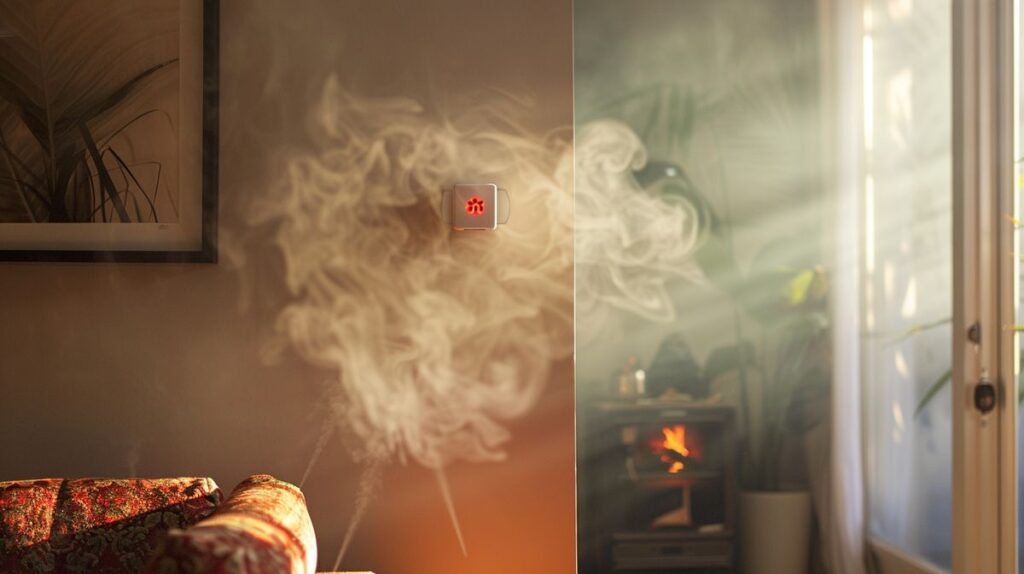
Double-check your alarm’s batteries and position them correctly to avoid those panic-inducing false triggers.
How often should I change the batteries in my smoke detector?
Fresh batteries mean fewer midnight scares. A good rule of thumb? Change your smoke detector batteries every six months. This simple habit ensures that your alarm system does its job without causing unnecessary alarms.
What should I do if my smoke alarm goes off in the middle of the night?
You’re sound asleep, then suddenly, the alarm blares. Here’s what to do:
- Check for fire or smoke: Safety first. If you spot any danger, evacuate immediately and call 911.
- No threat? Inspect the alarm for low batteries or dust. Often, it’s one of these sneaky culprits causing the fuss.
How can I prevent false alarms in my home fire alarm system?
Tired of false alarms? Here’s how to keep them at bay:
- Regular cleaning: Dust off your alarm every now and then.
- Change batteries: Do this every six months.
- Proper placement: Keep alarms away from kitchens and bathrooms.
- Watch out for environmental factors: Humidity and volatile organic compounds can be problematic.
These steps will ensure your alarm only goes off when it needs to.
Are photoelectric smoke detectors better than traditional ones?
Let’s talk detectors. Photoelectric smoke detectors are often a better choice for homes. Why? They’re particularly sensitive to smoldering fires and are less likely to annoy you with false alarms from cooking smoke. This makes them a safer, more reliable option for your residence.
I’m James Albright, a home security expert with over 15 years of experience, and I’m passionate about helping families protect what matters most. After serving as a police officer, I transitioned to security consulting to share my hands-on knowledge and practical tips. My mission is to make home security simple and reliable by offering clear, no-nonsense advice and easy-to-follow guides. When I’m not reviewing the latest security tech or writing, I’m out in the community leading neighborhood watch programs and, most importantly, keeping my own family safe.
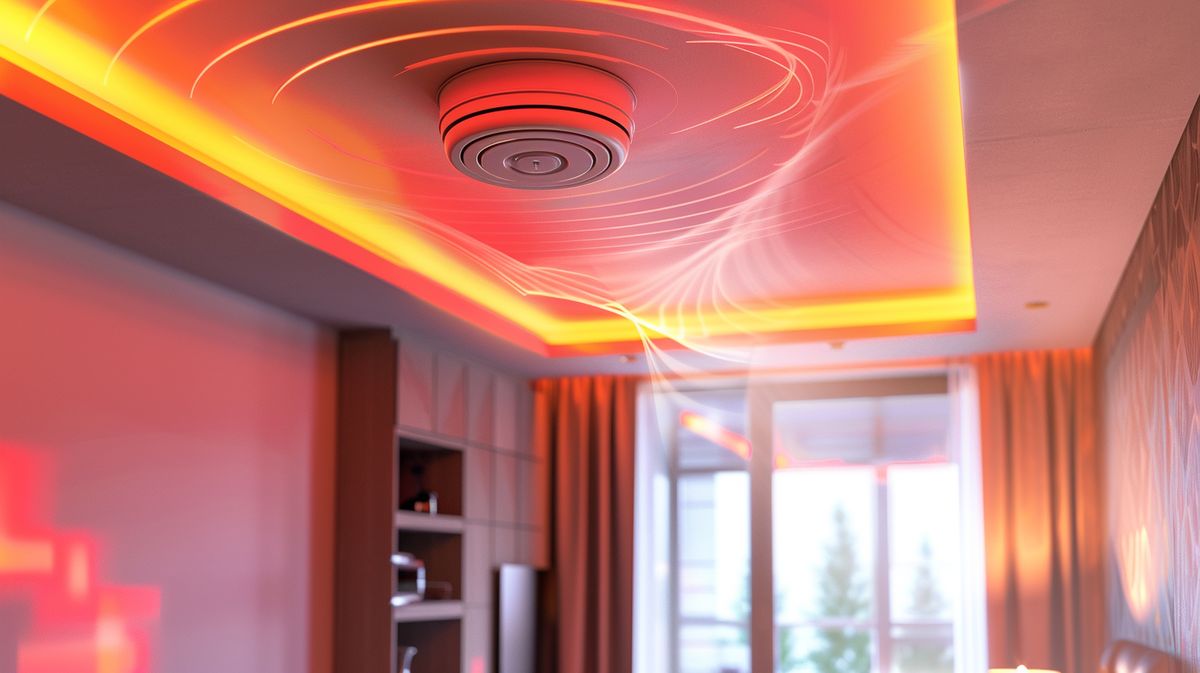
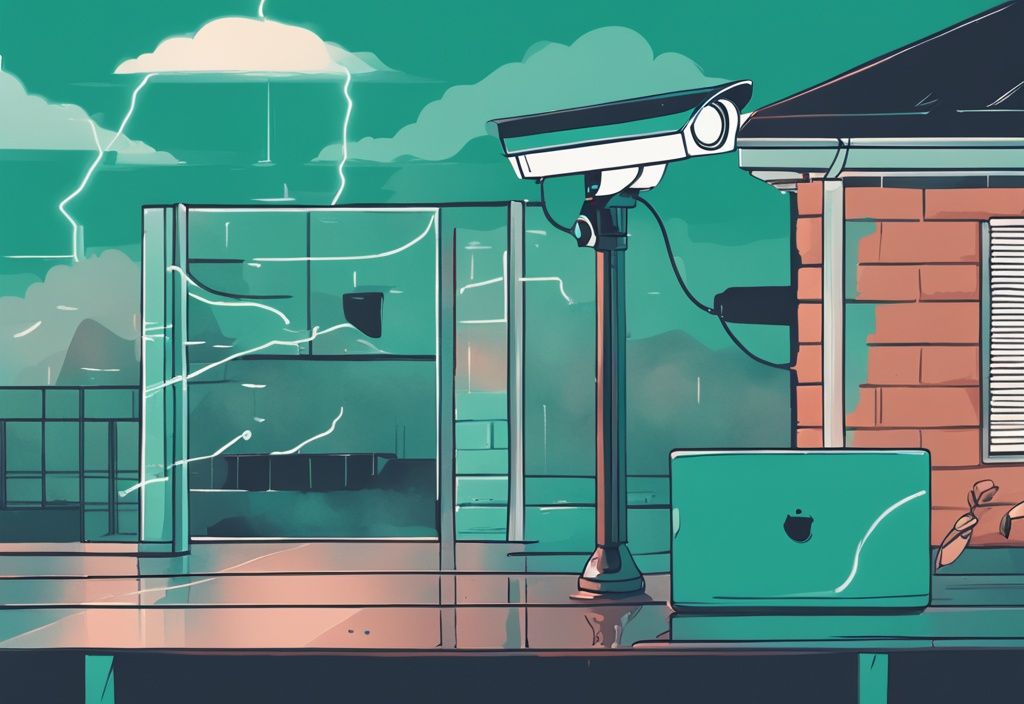
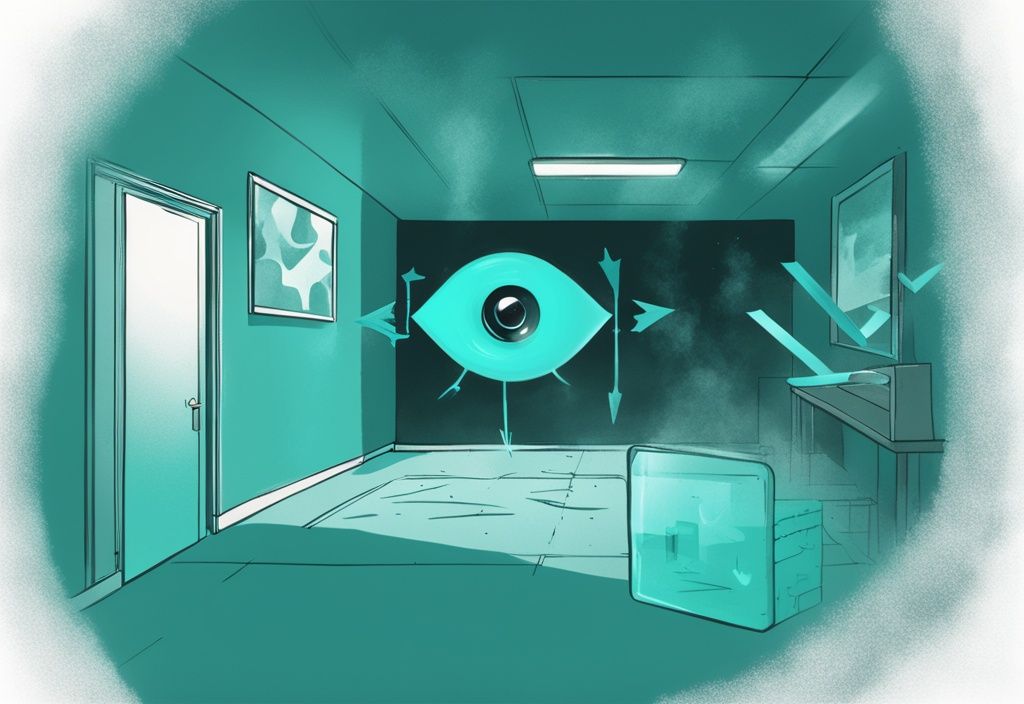


Post Comment